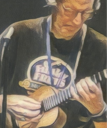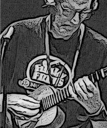Many cuatros are smaller than a guitar. Cuatro means four in Spanish, although current instruments may have more than four strings. The cuatro is found in South America, Trinidad & Tobago and other territories of the West Indies, and certain variants are considered the national instrument of some countries (e.g., Venezuela). Its 15th century predecessor was the Portuguese Cavaquinho, which, like the cuatro had four strings. The cuatro is widely used in ensembles in Colombia, Jamaica, Mexico, and Surinam to accompany singing and dancing. In Trinidad & Tobago it accompanies Parang singers. In Puerto Rico and Venezuela, the cuatro is used as an ensemble instrument for both secular and religious music.
The cuatro of Venezuela has four single nylon strings, tuned (A4, D5, F#5, B4) or (A3, D4, F#4, B3) depending on the strings you get. It is similar in shape and tuning to the ukulele, but their character and playing technique are vastly different.



Founded in 1997, Cordoba seeks to guide the evolution of the nylon string guitar, blending traditional craftsmanship of the early master luthiers with modern developments. Inspired by the organic beauty and honesty of acoustic instruments, every Cordoba is lightweight, responsive, and a direct descendant of the Spanish tradition. Córdoba continues to challenge the definition of the acoustic guitar without sacrificing the authenticity of its heritage.



.jpg)